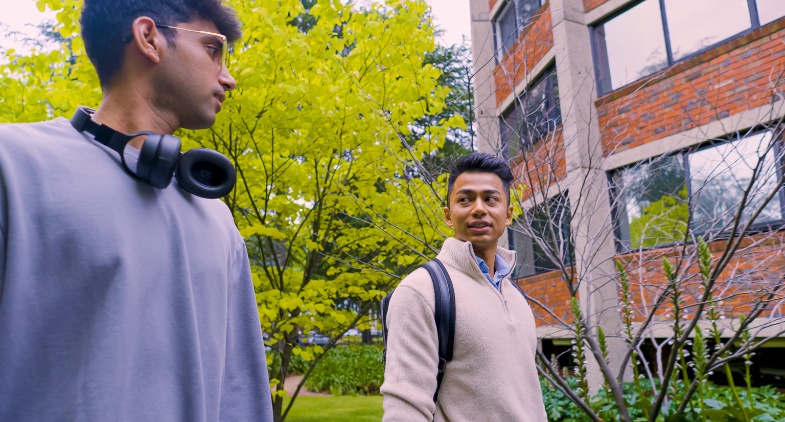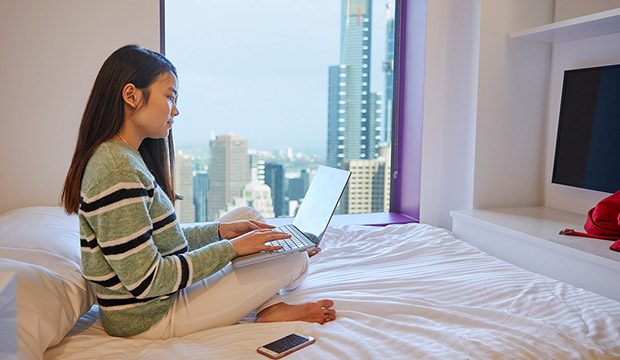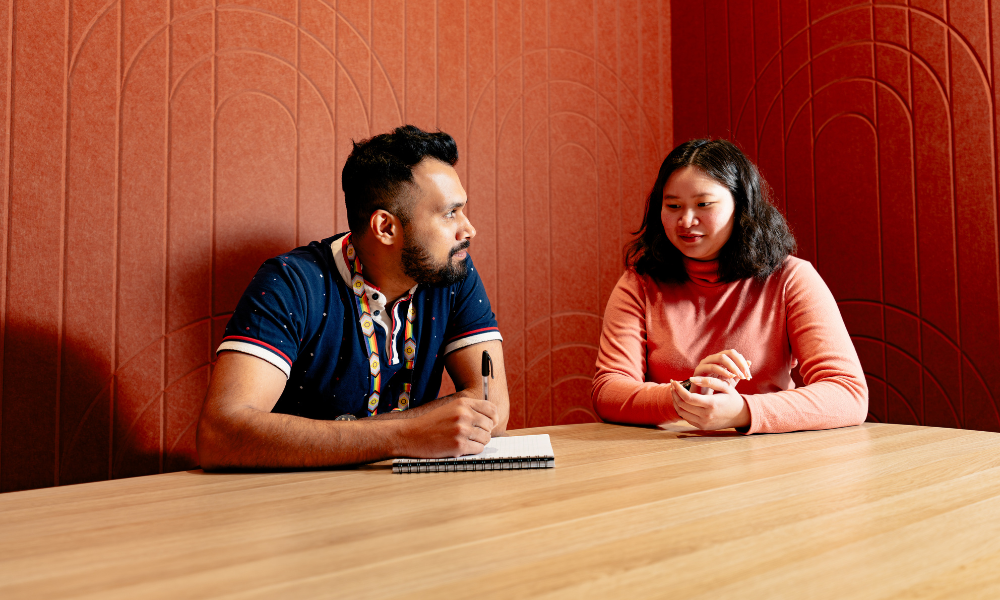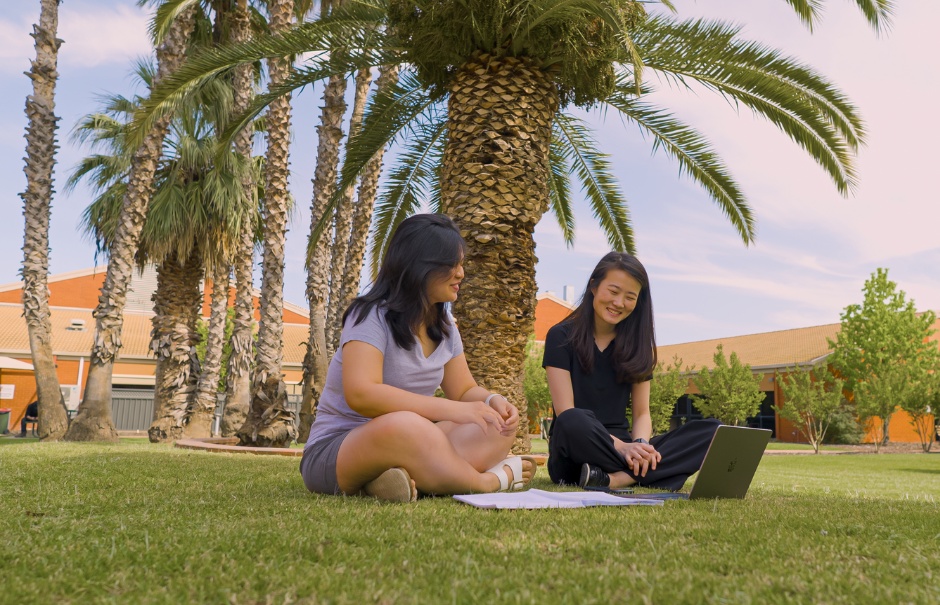So, you’ve chosen the amazing state of Victoria for your exciting study abroad adventure. Now it’s time to make some big decisions about where you’d like to live.
From homestays in country Victoria to private rooms for rent in Melbourne, here are some of the options on offer.
View transcript
[On-screen text Lester, International student. Lester is speaking to camera with a bookshelf in the background]
Lester: You've chosen the amazing state of Victoria for your international studies. Now it's time to make some big decisions about where you'd like to live. Firstly, it's time to choose a location. Victoria's capital city, Melbourne, is the ideal place for people who love the vibrancy of a big city.
[Lester in a park with city buildings in background, in a laneway, outside the State Library of Victoria]
As Australia's largest capital city, there are so many different places to live, and each one is unique. You can either live in the heart of the city, by the beach, walking distance from your campus, near parks and gardens...really, the options are endless!
[Scenes showing the city, bay areas, gardens and parkland]
In country Victoria, you'll find the perfect mix of life in Australia. Welcoming communities, coastal towns, natural beauty, and a relaxed lifestyle.
[Visuals of students standing next to the river, main street of country town, Geelong waterfront]
When it comes to making a decision, consider the atmosphere that you want, the education providers there, the cost of living, and the transport options.
If you need help in choosing the right location, chat to the team at the Study Melbourne Hub for their advice. Once you've chosen the location, now it's time to consider accommodation.
There are so many accommodation options for international students that suit your lifestyle and your budget. So, options include student accommodation, these are purpose-built residences for students to live in while they study.
[Lester walking streets of Melbourne, terrace houses]
Homestays - where you can live in with a local family in their house.
Residential colleges - these are university-owned residences for students on or near the campus; and private rentals where you can lease an apartment or house by yourself or with others.
While renting in Victoria, you'll enjoy the same basic rights and legal protections like anyone else.
[Visuals of high rise buildings, tram]
If you have any questions about your landlord, your rental rights, inspections, or applications, the Study Melbourne Hub team is here to help! If you're not sure about what kind of accommodation will suit you, take the Study Melbourne accommodation quiz. It will take into account your likes, your dislikes, and your lifestyle, and find the perfect future home for you.
[Student looking up accommodation quiz on laptop]
Or, if you would like to view your options in person, why not book a temporary accommodation, like a hotel, a hostel, or an Airbnb, and then start your search after you arrive.
[Lester in courtyard with trees, Study Melbourne Victoria logo]
[End transcript]
Types of accommodation for international students
One of the biggest decisions is choosing the type of accommodation you want to live in.
Private rental
Renting privately is a great choice for those who love their own space. You can lease your own apartment or save money by renting a room in a share house.
Typically, it’s best to inspect properties in person before you sign a lease. With that in mind, you may want to book a hostel or Airbnb, or stay with friends or family for your first couple of weeks in Australia. A short-term accommodation solution will give you the time to search for a longer-term rental and find the one that’s right for you.
While some places come furnished, you may have to provide your own furniture and appliances. This could include a bed, desk, couch, fridge or television, so try to factor this into your budget.
Student accommodation
Student accommodation is a style of residence built specifically for students to live there. Living in student accommodation is a popular option for international students. Not only do many student housing providers offer ample amenities - like study areas, gyms and activity rooms - they’re usually located close to campus as well.
View transcript
[Music]
[Speaker, Yi Su, China talks about living on campus in Melbourne, Australia. Filmed in the reading room at the State Library of Victoria]
I really like the experience of living on campus because they just provided you a really warm and safe environment to live and study and we also have lots of events it's a chance to meet different people it's really welcoming and if I
have any question about Melbourne I can just ask anyone and they're just so really friendly and helpful.
[Scenes around Melbourne, picnic on the banks of the Yarra River]
In terms of why you should come to study Melbourne I think it's really because of the friendly people and also the high quality of education. I highly suggest you to come to study Melbourne.
[Text on screen: Study in Australia's best student city. Make Melbourne part of your story. Study Melbourne, Victoria Australia logo and website address: studymelbourne.vic.gov.au Victoria State Government logo, Authorised by the Victorian Government, 1 Treasury Place, Melbourne]
Types of accommodation include university managed accommodation, residential colleges (often associated with a university) and purpose-built student accommodation such as Scape, Iglu, UniLodge, Journal, Yugo, Amberstudent, Y Suites, dwell and Village Melbourne City.
Your room rate typically includes all your bills and utilities, so this is an excellent option if you’d prefer an all-in-one price.
Student Accommodation Association (SAA)
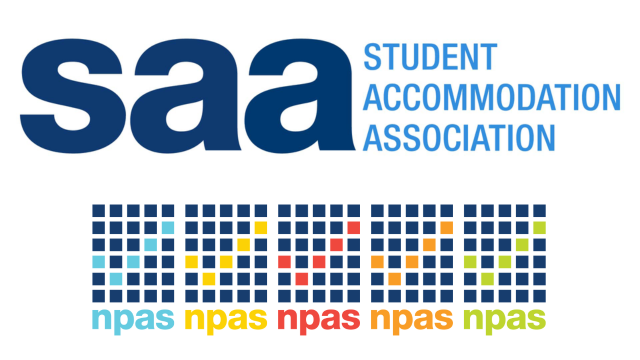 The National Property Accreditation Scheme (NPAS) is an industry-led program established by the Student Accommodation Association (SAA) to assist international students to identify quality, accredited accommodation for the exclusive use of students. For a property to be NPAS accredited it must meet industry standards with respect to the rooms, facilities, safety, and management.
The National Property Accreditation Scheme (NPAS) is an industry-led program established by the Student Accommodation Association (SAA) to assist international students to identify quality, accredited accommodation for the exclusive use of students. For a property to be NPAS accredited it must meet industry standards with respect to the rooms, facilities, safety, and management.
Visit the NPAS website for a list of accredited properties in Victoria.
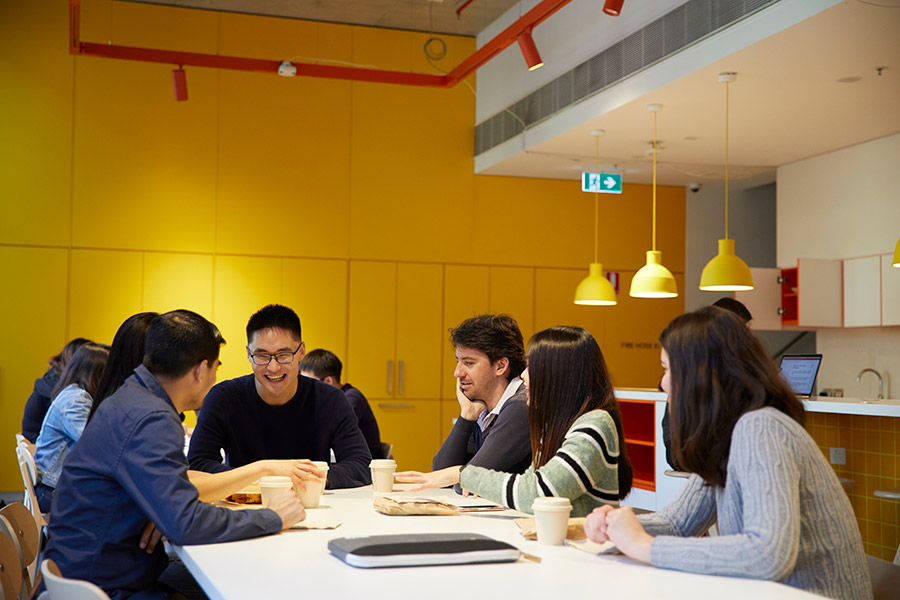
Residential college
If you’re willing to pay a bit more for convenience, residential colleges might be for you. A residential college is a university-owned form of accommodation. Conveniently located close to campus, you’ll enjoy a range of useful benefits, including study facilities, meals and even room cleaning. Check your education provider’s website to see what residential colleges are available.
Homestay
If you’re dreaming of an authentic Australian experience, a homestay in Victoria might be the perfect choice.
In a homestay arrangement, you stay with a local family in their home. Your weekly rate will cover your accommodation, utilities and internet and may even include some meals. This makes it a particularly convenient option for when you first arrive in Australia as everything will be set up for you.
Learn more about homestays via the Australian Homestay Network.
Important notice
We encourage students to consider an accredited homestay accommodation option as these properties have been assessed by NEAS to meet a minimum set of industry standards.
Rental scams (warning signs)
While most landlords and property managers are trustworthy, it’s important to be aware of rental scams.
In Victoria, it is most common for properties to be rented through a real estate agent. A real estate agent is a company, or a person from a company, that is employed by the owner of a property to rent it out. You should be able to check if an agent is genuine by looking online and seeing if they have a legitimate website and other properties available for rent.
There are also other ways to rent a property – for example, directly from the owner of the property or sub-letting from another renter. While these situations can be more accessible and lead to great living arrangements, there is also a greater risk they may be a scam.
Common warning signs to look out for include:
- Requests to pay before seeing or inspecting the property
- Requests to pay for arranging an inspection
- Requests to pay by cash or credit card instead of bank transfer
- Requests to pay a very high bond, more than one month’s rent and any other fees. Usually, a bond cannot be more than one month’s rent. A rental provider can only ask for more if the weekly rent is more than $900. They are also not allowed to ask you to pay more than one month’s rent in advance
- If the photos online look too good to be to be true or look to be much better value for money than most other properties
- Being asked to hand over your possessions or personal documents, like your passport
- Not receiving your own key or passcode for the building or being told not to answer the door
- If the person you are dealing with does not give you a standard residential rental agreement or is unwilling to provide their contact details.
- If the person you are dealing with tries to rush or pressure you into paying or agreeing, particularly without asking you to put in a formal rental application with some details about you. Feeling under pressure and a sense of urgency can be indicators of a scam.
Where to get help
If you think you’ve been the victim of a scam or are unsure about a situation, the Study Melbourne Hub is always here to support you. You can make an appointment to get free legal advice about accommodation issues.
Location options
You will also have to decide where in Victoria you’d like to live. Below, we look at some of the key considerations when deciding to live in Melbourne or country Victoria.
Live in Melbourne
As Victoria’s capital city, Melbourne is the ideal place for those who love the vibrancy of urban life.
Named Australia’s best student city and home to many world-class educational institutions, living here means being in the heart of the action. When you’re not busy studying, you can spend your time discovering the city’s incredible delights, from arts and culture to food, sports and festivals.
Learn more about some of Melbourne’s most popular student suburbs below.
Melbourne's CBD
If you love the hustle and bustle of city living, the lively vibe of the CBD is ideal for you. Here you’ll be surrounded by modern skyscrapers, busy commuters, running trams, and several iconic landmarks, including Flinders Street Station, the Queen Victoria Market and Federation Square.
Despite its busy atmosphere, you can still find tranquil spots to relax in the city centre, whether it’s a stroll through the Botanic Gardens or a picnic near the Yarra River.
Northern suburbs of Melbourne
Brimming with creativity, Melbourne’s northern suburbs of Carlton and Fitzroy house thought-provoking street art and unique cultural spots.
Collingwood is known for its youthful population (which largely consists of students like you) and its trendy food and drink scene.
Brunswick is an equally popular suburb for young people and is known for its more eclectic venues, which include cool boutiques, gourmet grocers and vintage shops.
Western suburbs of Melbourne
Melbourne’s west includes suburbs like Footscray and Yarraville. Dynamic and fast-growing, Footscray is renowned for its multicultural food scene. It is widely considered one of the best areas in Melbourne to get Vietnamese, African and Indian food.
Small and charming, Yarraville features several heritage-listed buildings, making you feel like you’ve stepped back in time. Despite its historic feel, Yarraville has modern facilities you’re sure to enjoy, including a cinema and plenty of restaurants and bars.
Eastern suburbs of Melbourne
In the east, you’ll find a diverse range of vibrant suburbs. Richmond is home to some of Melbourne’s best Vietnamese food, with Victoria Street affectionately known as ‘Little Saigon’ and the pho capital of Melbourne.
Hawthorn is packed with foodie spots, quirky shops, leafy spaces, and fun things to do, such as catching a film at Lido Cinema or paying a visit to the Melbourne Tram Museum.
Southern suburbs of Melbourne
St Kilda is known for being a hub of leisure and recreation. Whether you’re looking for a day of relaxation at St Kilda Beach or heart-pumping fun at Luna Park, this suburb has something for everyone.
South Yarra is one of the best places in Melbourne for shopping, particularly Chapel Street, which is one of the most renowned shopping precincts in the country.
Live in Country Victoria
If you haven’t considered country Victoria, you might be missing out on your perfect match.
From the authentic small-town experiences of Churchill to laid-back atmosphere of booming regional centres like Mildura, there’s something for everyone here. You can even choose big cities, such as Geelong or Bendigo, where you can enjoy the best of urban life.
What’s more, with internationally recognised institutions operating across the state, you’ll be able to get a quality education while enjoying an experience like no other.
Location atmosphere
Every suburb has something different to offer. Consider what kind of amenities and/or atmospheric elements are important to you.
Maybe you’re a nature lover, so it’s crucial that you’re close to parks, leafy green spaces and beaches. Maybe you love going out, so you need to live in an area with plenty of bars, restaurants and cafes.
Think carefully about the kind of environment you want to immerse yourself in and find a suburb that aligns with this.
Price of accommodation
When deciding where to live, it’s a good idea to think about cost. Knowing what you can afford can help you narrow down your options.
For example, if you’re looking to move to the city but want to save on accommodation, you could look for a room for rent in Melbourne a little further out of the city centre. This will be a cheaper alternative to renting your own inner-city apartment.
Transport nearby
Another crucial thing to consider is how you’ll get around during your stay. Try to find accommodation close to public transport, especially if you’re not living near campus.
Melbourne’s comprehensive network of trains, trams and buses makes it easy to get wherever you need to go. Most regional areas also have regular and reliable public transport.
Pick up a myki card to use public transport across the state, or save up to 50% on your travel costs with an International Student Travel Pass (for eligible undergraduate students from participating institutions).
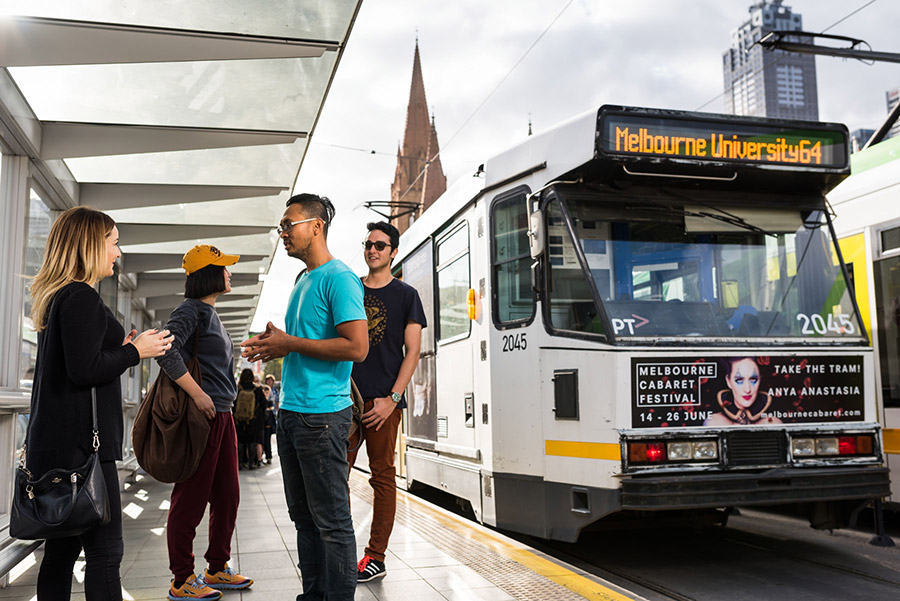
Getting help choosing where to live
If you’re still unsure, there are a few places you can go for more help and advice.
Asking around can be an excellent way to hear of options and opportunities you might not otherwise know about. Check with friends, family and your fellow students to see what they recommend.
Don’t forget to check your educational provider’s website as it may have recommendations for housing providers and nearby suburbs or other advice on renting in Victoria.
Finally, you can always reach out to the team at the Study Melbourne Hub for more guidance.
Page last updated:

